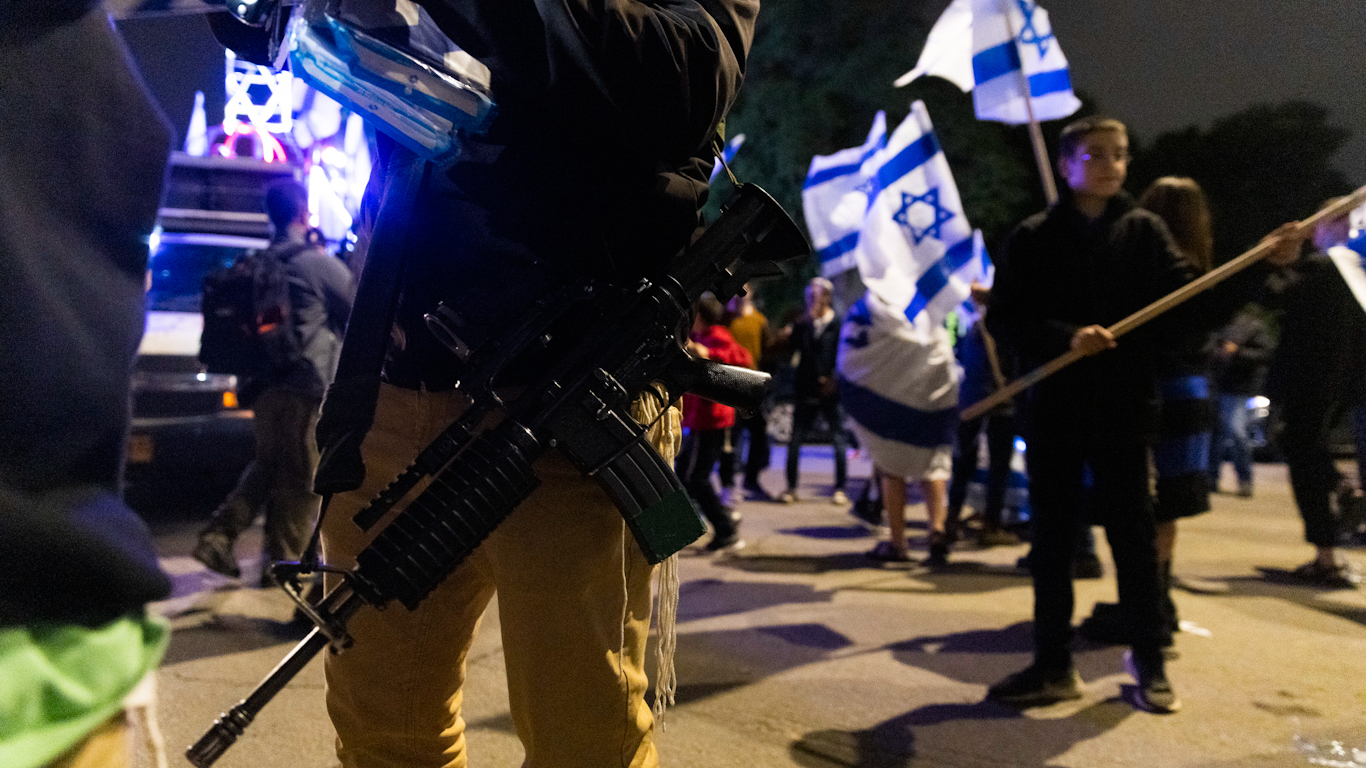LYD, OCCUPIED PALESTINE – “I will take you to the home of Musa Hassuna, the Shahid,” Fida Shehada wrote to me. This was in February of this year. I was in Palestine and planned to go to Lyd to see Fida, a councilwoman for the city. I had met her previously and interviewed her about her work and her effort to unseat the current mayor of the city, who is a well-known racist and inciter of anti-Palestinian sentiment.
Sadly, I had visited many homes of Palestinians who had been martyred by Israel. Usually, they were young people leaving behind grieving parents, siblings, and often young, orphaned children. Musa was 31 years old, husband to Marwa and father to Mila, 7, Ibrahim, 5, and Ahmed, who is just a year-and-a-half old.
Musa Hassuna
We met at Fida’s home in Lyd. From there, a couple of young Palestinian student activists and I drove to Musa’s house. Musa was a truck driver who loved life and loved his family. “We were never politically involved,” Mawra said to me when we sat in the living room of their lovely, spacious home. “Now look at me. By killing my husband they made an activist out of me.”
Musa was killed on the night of May 10, 2021. “Tell me about the day he was killed,” I asked Marwa. “He worked that day from 5 a.m. to 6 p.m., as always,” she replied. Even though it was the month of Ramadan when Muslims fast all day, Musa worked his regular hours as most people in Palestine do. “He came home and we all sat together for a bit, then he went to water the yard. We had planned to go to the mall that evening to break the fast and then go shopping for our vacation.” The Hassunas were supposed to fly to Dubai for a family vacation two days later.
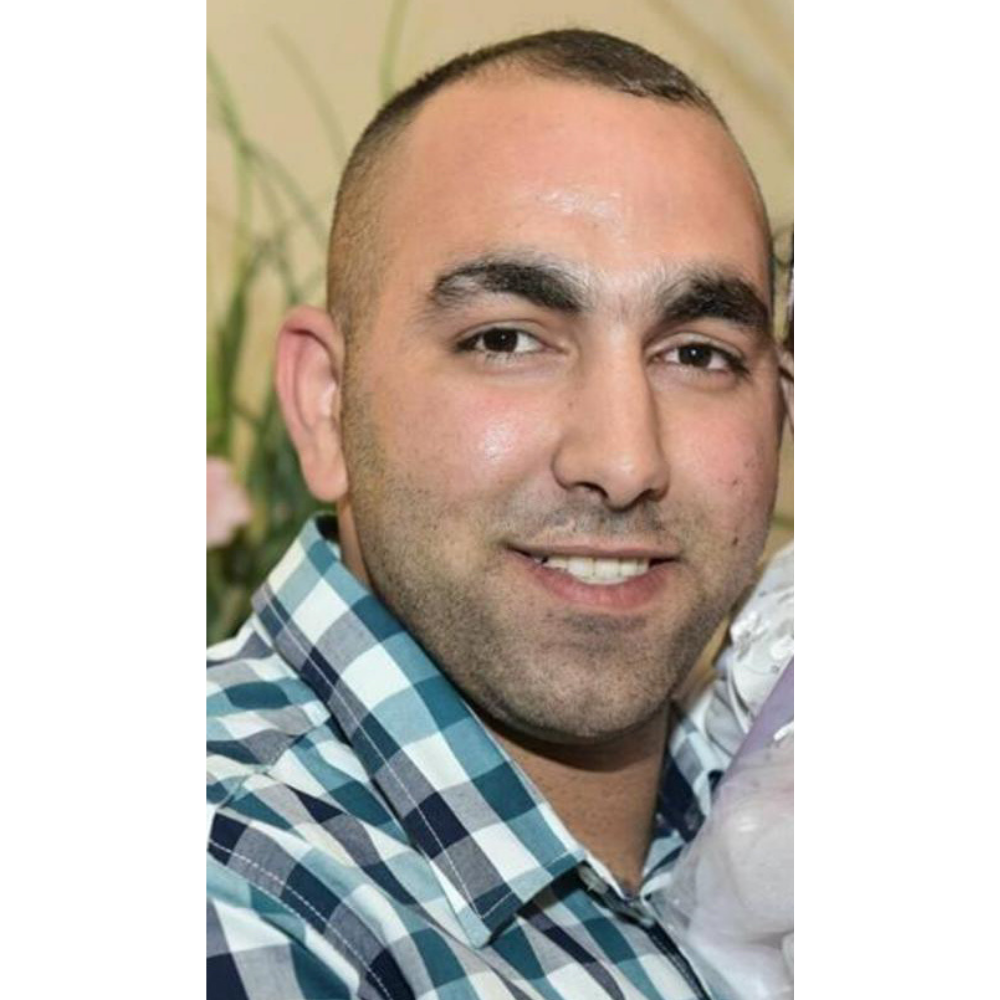
Musa Hassuna. Photo | Courtesy of Marwa Hassuna
“At 10:30 p.m. we left the mall and we were in disbelief, the city was in total chaos. We knew there were protests planned for that day but we didn’t imagine it would reach this level. We drove home and I dropped Musa at a friend of his who has a grocery store.”
Marwa went home and started to pack for their vacation. “I called Musa a few times to remind him we still had to go to the airport to get our pre-flight COVID test.”
Musa went to see his brother-in-law, Marwa’s brother, who lives near the plaza where Musa was later gunned down. There were armed Israeli Jews, locals, standing there with Israeli flags. They were throwing rocks and vandalizing cars that belonged to Palestinians. One of the rocks hit the car that belonged to Marwa’s brother and smashed the window, so Musa rushed out to move the car to a safer place.
“Last time I spoke to Musa was 12:40 a.m.,” Marwa recalled. “He said he’d be home in two minutes. When 15 minutes had gone by, I tried to call him again and there was no answer. I was terrified. I had a feeling that something bad happened. Then my sister-in-law called and asked me where I was and hung up.”
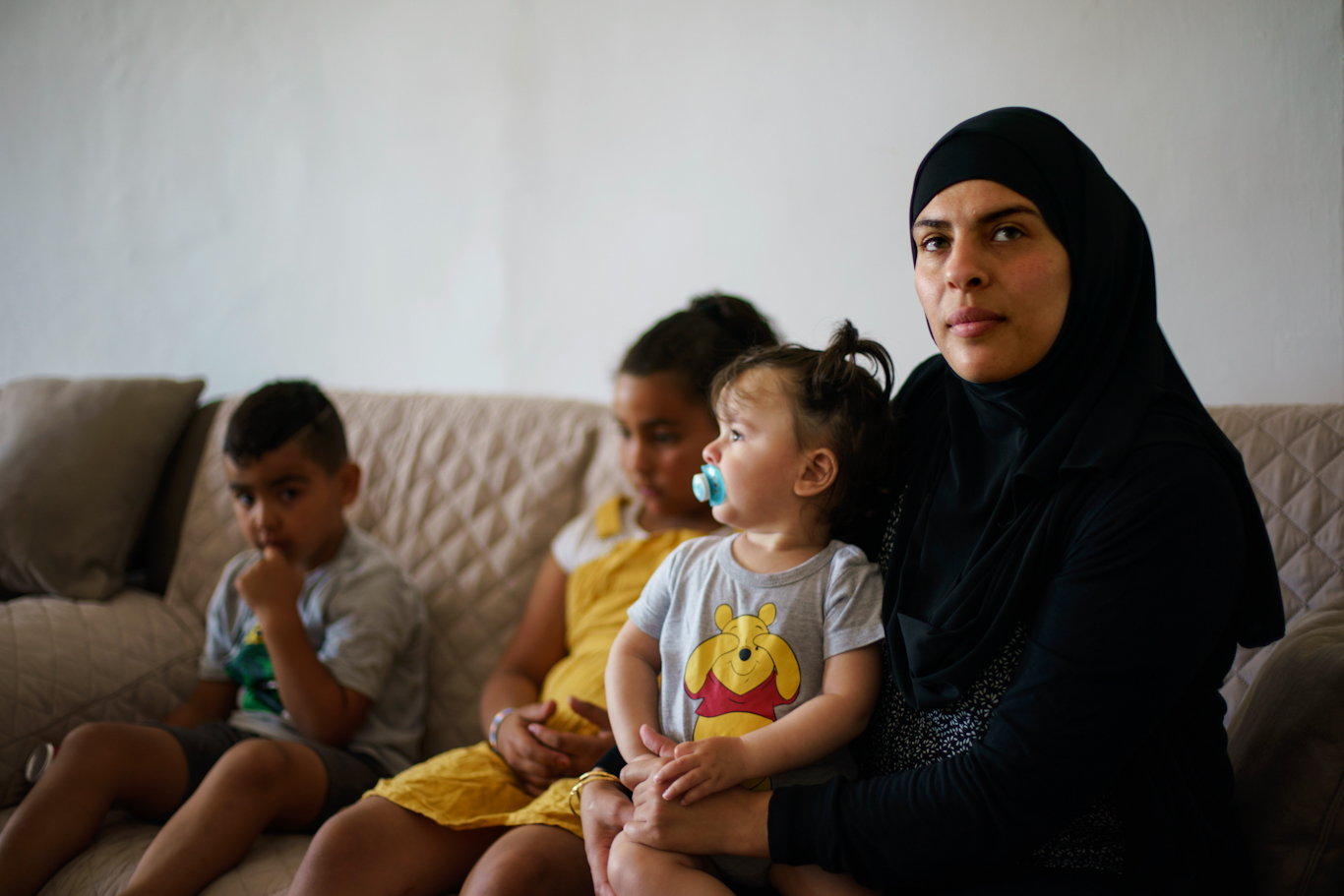
Marwa Hassuna, right, with her children at their family home in Lyd, May 29, 2021. David Goldman | AP
That was when Marwa knew. She rushed out of the house when she received another call. “They’re saying that someone by the name of Musa Hassuna was killed.”
Marwa rushed to the hospital where Musa was in intensive care. After 3 a.m., once the hospital was surrounded by Israeli police, she was given the news. Musa was dead.
“Musa was the love of my life,” Marwa wrote to me later. “He had a huge heart full of love.”
Police respond with more violence
Once the announcement was made and crowds came to the hospital, the police began indiscriminately shooting tear gas and stun grenades. “No one talked to us,” Marwa remembered. “The police didn’t even come to ask questions. At one point they called me to say that there were three suspects in custody.”
Two guns belonging to local settler gangs were found to have been used that night but the three suspects, two of whom fired their guns that night at the place where Musa was killed, were released a day later. “Six months later I was notified that their files were closed,” Marwa told me. No charges were brought against any of Musa’s killers.
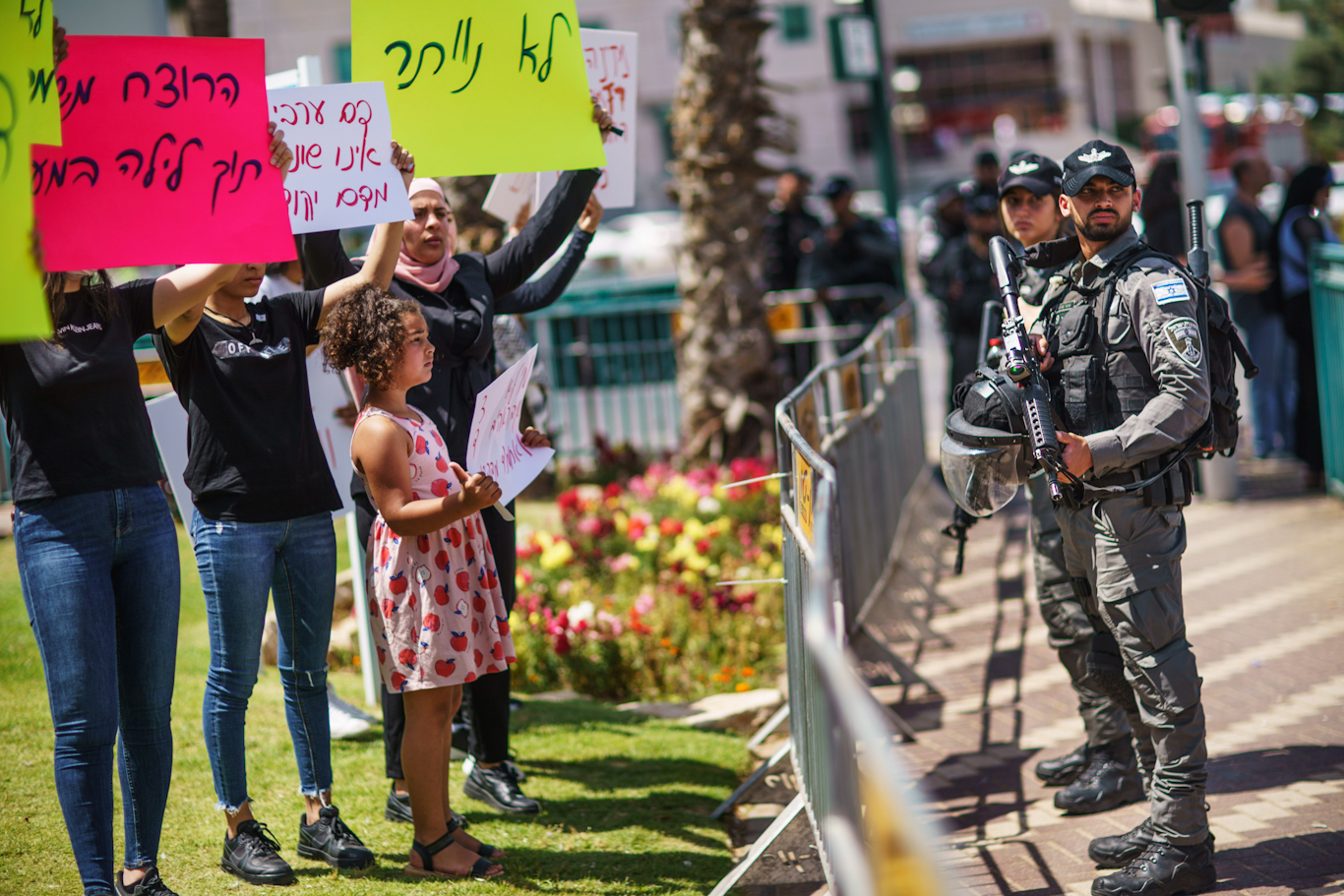
Police watch protesters calling for justice in the killing of Musa Hassuna Lyd, central Israel, May 28, 2021. David Goldman | AP
“I haven’t even told you what happened when they brought his body to our home for a final farewell,” Marwa later wrote to me. The funeral took place on May 11, the day after Musa was killed. Settlers drove around the house, honking and yelling “Death to Arabs!”
“They surrounded the house and followed the funeral procession,” Marwa said. When they reached the cemetery there was “Death to Arabs” graffiti on the walls. “What did the police do?” I asked Marwa. “They were busy shooting tear gas and stun grenades at us.”
Settlers brought in to terrorize Palestinians
Usually the term “Settler” refers to members of the religious-Zionist movement who initiated the first Zionist settlements in the West Bank. That movement has grown considerably both in political influence and in numbers. Israel’s current prime minister, Naftali Bennett, is from within that group and in fact, was the head of a settler organization in the West Bank.
These groups often see themselves as the successors to the early Zionist settlers who occupied most of what is now 1948 Palestine or, as some like to call it, “Israel proper.”
In the last decade, the religious-Zionist movement has made a concerted effort to “settle in the hearts of ordinary Israelis.” They call themselves “Seeds of Torah,” as though their hate-filled ideology is somehow connected to Jewish tradition, and they move into mixed cities where both Palestinian and Jewish citizens of Israel reside.
Some refer to these cities as places where “Jews and Arabs live together”; however there is no “togetherness” in them. The aim of the settlers is to spread and incite hatred against Palestinians, eventually forcing them out, violently if necessary. In fact, Lyd’s mayor, Yair Revivo, comes from a settler community.
No Jews were arrested
Ghassan Munayer is a local leader who has lived in Lyd for his entire life. He worked as an aid to the Balad Party in the Israeli Knesset. He was also at the home of Musa and Marwa the night we visited and we sat and talked at length. “After the attacks by settlers were documented,” he said, “we demanded answers in the Knesset from the Minister of Internal Security. He told us, and I quote, ‘no Jews were arrested.’”
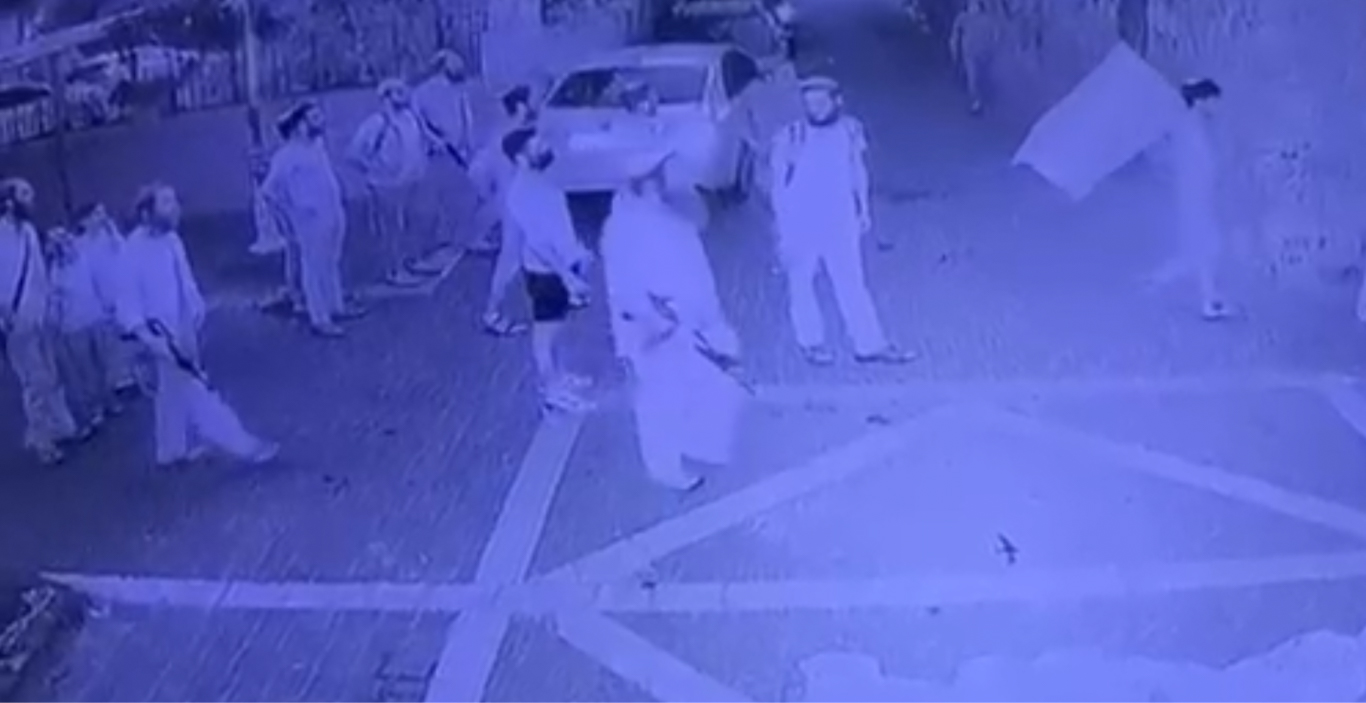
Armed Settlers in front of the Mosque in the Old City of Lyd. Photo | Gassan Munayer
Between May 12 and May 15, after Musa’s funeral, hundreds of armed settler gangs were brought to Lyd from other locations. Many were bused in from the West Bank, where they are the most heavily armed. As a curfew was imposed on the Palestinian residents of the city, settlers wandered freely through the streets day and night, vandalizing property and shooting.
“At least five hundred [settlers] were housed in city hall,” Councilwoman Fida Shehada told me. This was an issue about which she demanded answers from the mayor, who himself comes from the settler community.
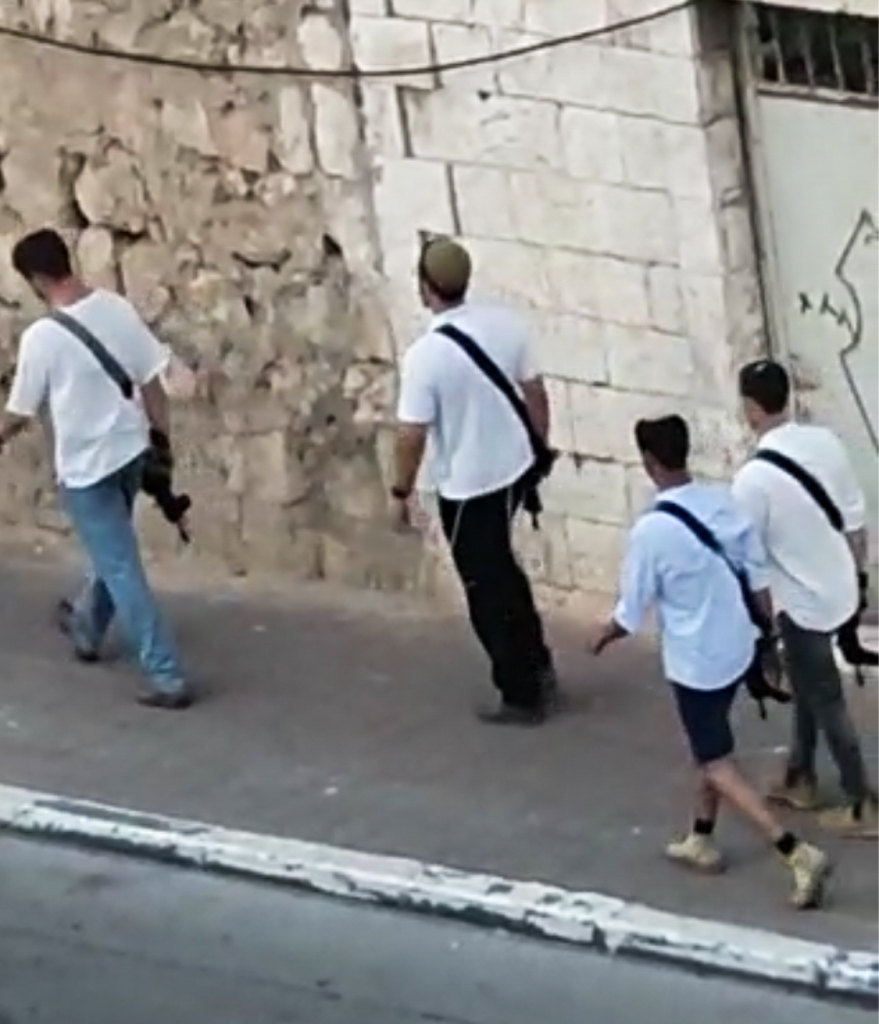
Armed settlers patrol Lyd. Photo | Ghassan Munayer
Telling the children
Marwa remained in the hospital until her husband’s body was moved to the morgue.
“As I drove home, all I could think of was how do I tell the children. I was told by Mila’s teacher (the oldest daughter, who was seven at the time) and by the school counselor to tell them the truth.”
Mila begged to be allowed to go to the hospital and save her father. Ibrahim was five and Ahmed was merely a baby.
Each month on the tenth of the month, a group gathers at the spot where Musa was martyred to demand justice. May 10, 2022, will be the one-year mark and no one is expecting to see justice.”
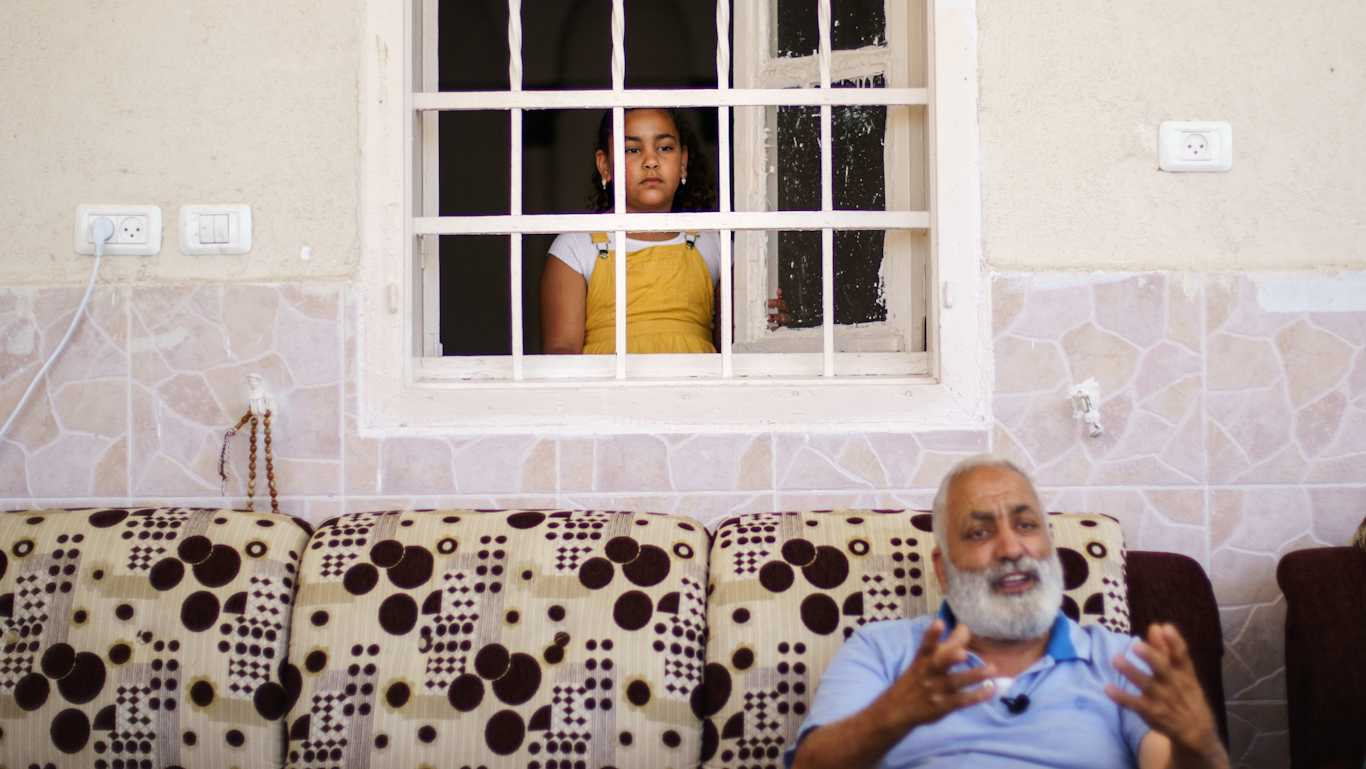
Mila Hassuna, 7, looks out a window as her grandfather talks about the death of his son Musa, May 29, 2021. David Goldman | AP
The violence and racism inflicted on Palestinians in Lyd is nothing new. It is only getting worse.
As the holy month of Ramadan approaches, we would be wise to expect more attacks on Palestinians in Lyd and throughout Palestine. The question that remains is how many more children will be orphaned, and how many more parents will bury their children because of Zionist violence?
Feature photo | Israeli right-wing settlers take part in a “flag march” in the city of Lyd, December 5, 2021. Photo | Activestills
Miko Peled is MintPress News contributing writer, published author and human rights activist born in Jerusalem. His latest books are”The General’s Son. Journey of an Israeli in Palestine,” and “Injustice, the Story of the Holy Land Foundation Five.”
The post No Prevention, No Punishment, No Justice: The Murder of Musa Hassuna by Zionist Settlers appeared first on MintPress News.
